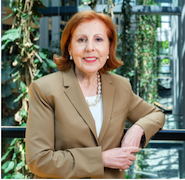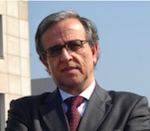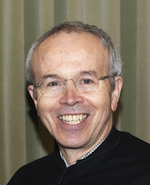Member of the European Parliament
Rector of Universidade Portucalense Infante D. Henrique
Rector of the University of Coimbra from 2011 to 2019
It has always been a major duty of academics to (try to) think ahead. We take 2030 as an adequate horizon for us to somehow anticipate the dimension and the challenges of the transformations on our way of life that are under progress, within this so-called Revolution 4.0, and accordingly to prepare the (present and the) future of Higher Education (HE). In this session, some ideas will be presented pertaining to the main face of the polyhedron of HE, the learning process, indeed the main subject at stake when we speak of the need for urgent reforms in HE. The main issue to be addressed will be that of how the digital transformation of society brings in the need for a deep pedagogical innovation attitude, requiring and calling for institutional vision and investment and for individual participation and commitment. Such transformation requires and includes several interrelated initiatives, namely (i) strengthening the concept of Education without walls and without borders, by consolidating a new concept of classroom and of lecture, indeed a don't lecture concept; (ii) promoting a dual academic offer, on-campus and online, making wide use of digital platforms in a framework of continuous education; and (iii) teaching in an era where information, valid and invalid, is abundant and within immediate reach.
Within this context, the following contributions will be brought for the discussion:
Graduates beginning a career are increasingly aware that they will have to continue to study throughout their lives to keep up with the demands of the labor market. They know that they are unlikely to have a “job for life” and will probably even change fields. In higher education, what students who are born in this constantly changing technological world expect are courses that give them excellent theoretical and practical preparation. But also a training that guarantees them a sufficiently wide repertoire of skills - including the so-called soft skills, such as communication skills and adaptability - to be able to retrace their path as often as needed. Employers' expectations do not differ much.
Concepts such as “multidisciplinary”, “holistic learning”, the replacement of traditional “subjects” with broad “themes” that combine various areas of knowledge, “customized training” options as an alternative to closed courses, are part of the new answers that must be given. However, they will only be achievable with the commitment of policy makers, who have to remove obstacles, particularly legal ones, in order to enable the adaptation of higher education institutions.
In the presentation, emphasis will be put on the necessary reforms needed, in terms of higher education institutions and the higher education system, in order to address these challenges.
Internet search engines have been in widespread use for only about 20 years, but they have profoundly changed our access to information, which is now enormously quicker to obtain. The ease of access to invalid information has also risen enormously.
For educators it is clear that the teaching process has to change in a fundamental way. Classes and courses are no longer a mechanism for students to have access to information, but a way to attain insight from the information they already have, independently of schools, at the reach of their fingers. Leading the students to insight has been the main challenge for a very long time, but it was quite often obscured by the need to provide them with information, as an unavoidable step to insight. Now the challenge for a teacher is save the student from drowning in the sea of information we are all immersed in, that the teacher does not control at all, and bring them to an understanding of things – a very difficult task.
At the same time, the student has to learn, as a matter of survival, to sort out valid information from the deluge of invalid data that floods the internet. The required critical judgement is an ability that has to be developed, with the help of the teacher, something that was not such a central issue just a few decades ago.
The two main sets of issues concerning the education process are those concerning the academic substance and the learning process. The former has for ages been at the heart, or the heart, of the education process and for sure should not at all be neglected or devaluated in the discussions, but the learning process is indeed the main subject at stake when we speak of the need for urgent reforms in HE. This latter will be the focus of the comments that follow. And, what we see is that, possibly still slowly, but steadily, an environment of education without walls and without borders, together with a new concept of classroom and of lecture are under construction. Concerning this matter, a number of issues will be raised for discussion, namely: (i) promoting a dual academic offer, on-campus and online, making wide use of digital platforms in a framework of continuous education; (ii) adopting the existing (and those to come) collaborative tools (e.g. Google Apps and MOOCs), in a process of promoting student emancipation and student centred learning, particularly in terms of self-learning between peers; (iii) adopting (and adapting to) existing (and those to come) tools such as the digital assistants or the chatbots; (v) adapting the physical space of the Campi to meet the needs of this new learning process.
Irrespective of the degree structure, the learning methods must be relevant in promoting that the students develop skills, competences and attitudes, further to those more directly associated to the discipline, that are recognized today as absolutely relevant for the student global education, viz. - : a multidisciplinary sense and vision of the phenomena; critical thinking for both academic and social issues; a social sense of multiculturalism; a vision of sustainability; ethical judgement; team versus independent work; self-study capacity; communications ability.
All in all, we should have no doubts that a sweeping revision of education practices is indeed required, both at institutional and individual (teachers/professors) level, to meet the challenges not only of a true technological disruption that is happening, but mainly of the expectations of young people that are growing up with completely new concepts of learning, communication and socialization through networking, indeed new concepts of life.
 Maria da Graça Carvalho is currently member of the European Parliament (2019-2024). In the European Parliament she is a full Member of the Committee on Industry, Research and Energy (ITRE) and a substitute Member on the Committee on the Internal Market and Consumer Protection (IMCO) and substitute member on Committee on Women's Rights and Gender Equality (FEMM).
Maria da Graça Carvalho is currently member of the European Parliament (2019-2024). In the European Parliament she is a full Member of the Committee on Industry, Research and Energy (ITRE) and a substitute Member on the Committee on the Internal Market and Consumer Protection (IMCO) and substitute member on Committee on Women's Rights and Gender Equality (FEMM).
She follows as well the parliamentary Delegations for relations with the United States, for relations with the countries of Central America and Delegation to the Euro-Latin American Parliamentary Assembly.
In the past, Maria da Graça Carvalho has also served as member of the European Parliament in the EPP group from 2009-2014. She sat on the Industry, Research and Energy (ITRE) Committee as a full member and was a substitute member of the Committee on Budgets. In the Budget Committee, she acted during the 5 years as permanent EPP shadow rapporteur for the science and innovation budget and as rapporteur for the space budget.
As a MEP, she was appointed rapporteur of the Specific Programme Implementing HORIZON 2020 and of the report on Simplification of the Rules of Participation in the European Programs for Research and Innovation. In 2011, she was awarded the Prize for the best MEP in the area of Research and Innovation.
Maria da Graça Carvalho has been a Member of the Scientific Advice Mechanism Unit of the Directorate-General Research and Innovation of the European Commission from 2016 until 2019. She was a senior advisor of Commissioner for Research, Science and Innovation from November 2014 to December 2015. She was Principal Adviser of President of the European Commission in the areas of Science, Innovation, Energy, Environment and Climate Change from 2006 to 2009. She was Minister of Science and Higher Education of the XV Constitutional Government and Minister of Science, Innovation and Higher Education of the XVI Constitutional Government of Portugal.
She is a Full Professor at Instituto Superior Técnico (University of Lisbon) and she has acquired 30 years of experience in research in the areas of energy, climate change and science, technology and innovation policy.
 Sebastião Feyo de Azevedo was born in Porto, Portugal, in 1951. He holds a Ph.D. in Chemical Engineering from the University of Wales (1982). He is currently, since the 14 November 2019, Rector of Universidade Portucalense Infante D. Henrique. In the recent past he had the following main duties: (1) At academic level: Rector of the University of Porto (2014-2018); Dean of Engineering (2010-2014); Head of Chemical Engineering Department; Director of Graduate and Postgraduate Studies in Chemical Engineering; National Director of the Research Institute for Systems and Robotics; (2) With the Administration: Special Adviser to the Minister of Science, Innovation and Higher Education for the Bologna Process and National Delegate in the BFUG-Bologna Follow-up Group; (3) In relation with the engineering profession: Vice-President of the Portuguese Institution of Engineers; Chairman of the National Committee FEANI- Fédération Européenne d'Associations Nationales d'Ingénieurs and representative in FEANI’s General Assembly (2004–2010); (4) With international associations: Vice-president of the Administrative Council of ENAEE - European Network for Accreditation of Engineering Education (2009-2012); Member of the Board of Directors of CESAER - Conference of European Schools for Advanced Engineering Education and Research (2011 - 2014) ; Chairman of the Working Party on Education of the European Federation of Chemical Engineering (2007-2010). Main awards and distinctions: On November 24, 2018, he received the Gold Medal of the Institution of Engineers, Portugal; On July 30, 2018, he was awarded by His Excellency the President of Republic, Marcelo Rebelo de Sousa, the Grand Cross of the Order of Public Instruction; On February 9, 2018, he was awarded the Honorary Doctorate by the Ivane Javakhishvili Tbilisi State University, Georgia for his activity in favor of international cooperation; He is the recipient of the Dieter Behrens Award, 2013, highest distinction of the European Federation of Chemical Engineering. Main deliverables: Co-author of 130+ scientific publications; Author of 200+ opinion and dissemination papers and general publications and of 200+ invited conferences, seminars and/or advanced courses, both in scientific, education and professional matters, with emphasis in the higher education reforms associated to the Bologna Process.
Sebastião Feyo de Azevedo was born in Porto, Portugal, in 1951. He holds a Ph.D. in Chemical Engineering from the University of Wales (1982). He is currently, since the 14 November 2019, Rector of Universidade Portucalense Infante D. Henrique. In the recent past he had the following main duties: (1) At academic level: Rector of the University of Porto (2014-2018); Dean of Engineering (2010-2014); Head of Chemical Engineering Department; Director of Graduate and Postgraduate Studies in Chemical Engineering; National Director of the Research Institute for Systems and Robotics; (2) With the Administration: Special Adviser to the Minister of Science, Innovation and Higher Education for the Bologna Process and National Delegate in the BFUG-Bologna Follow-up Group; (3) In relation with the engineering profession: Vice-President of the Portuguese Institution of Engineers; Chairman of the National Committee FEANI- Fédération Européenne d'Associations Nationales d'Ingénieurs and representative in FEANI’s General Assembly (2004–2010); (4) With international associations: Vice-president of the Administrative Council of ENAEE - European Network for Accreditation of Engineering Education (2009-2012); Member of the Board of Directors of CESAER - Conference of European Schools for Advanced Engineering Education and Research (2011 - 2014) ; Chairman of the Working Party on Education of the European Federation of Chemical Engineering (2007-2010). Main awards and distinctions: On November 24, 2018, he received the Gold Medal of the Institution of Engineers, Portugal; On July 30, 2018, he was awarded by His Excellency the President of Republic, Marcelo Rebelo de Sousa, the Grand Cross of the Order of Public Instruction; On February 9, 2018, he was awarded the Honorary Doctorate by the Ivane Javakhishvili Tbilisi State University, Georgia for his activity in favor of international cooperation; He is the recipient of the Dieter Behrens Award, 2013, highest distinction of the European Federation of Chemical Engineering. Main deliverables: Co-author of 130+ scientific publications; Author of 200+ opinion and dissemination papers and general publications and of 200+ invited conferences, seminars and/or advanced courses, both in scientific, education and professional matters, with emphasis in the higher education reforms associated to the Bologna Process.
 João Gabriel Silva was the Rector of the University of Coimbra from 2011 to 2019. He is full professor of Informatics Engineering. He has been responsible for an intense internationalization of the University of Coimbra, with a strong thrust to align it with international quality standards, bringing it to the leading position of global student attraction in Portugal. He got his PhD in Electrotechnical Engineering/Informatics in 1988. He was Dean of the Faculty of Science and Technology from 2006 to 2011, having participated in many Portuguese and European funded research projects with many international strongly cited papers in Dependable Computing and Software Engineering. He chaired several international Scientific Conferences. He directed many industrial projects, among them the first Portuguese computer, the Ener 1000, back in 1981-86.
João Gabriel Silva was the Rector of the University of Coimbra from 2011 to 2019. He is full professor of Informatics Engineering. He has been responsible for an intense internationalization of the University of Coimbra, with a strong thrust to align it with international quality standards, bringing it to the leading position of global student attraction in Portugal. He got his PhD in Electrotechnical Engineering/Informatics in 1988. He was Dean of the Faculty of Science and Technology from 2006 to 2011, having participated in many Portuguese and European funded research projects with many international strongly cited papers in Dependable Computing and Software Engineering. He chaired several international Scientific Conferences. He directed many industrial projects, among them the first Portuguese computer, the Ener 1000, back in 1981-86.
| 04 Nov 2019 | Abstract submission, Proposals for Special Sessions, Panels and Workshops |
| 18 Nov 2019 | Invitation to submit complete papers |
| 29 Dec 2019 | Complete paper upload for accepted abstracts (main conference) Submission of complete papers for Special Sessions, Work In Progress and Student Poster (no abstracts) |
| 28 Jan 2020 | Notification of Acceptance, Author Registration open |
| 28 Feb 2020 | Author/Early Bird registration, Camera-ready submission for all submission types |
| 27 Apr 2020 | Pre-conference Workshops |
| 28 Apr 2020 | Conference Opening |